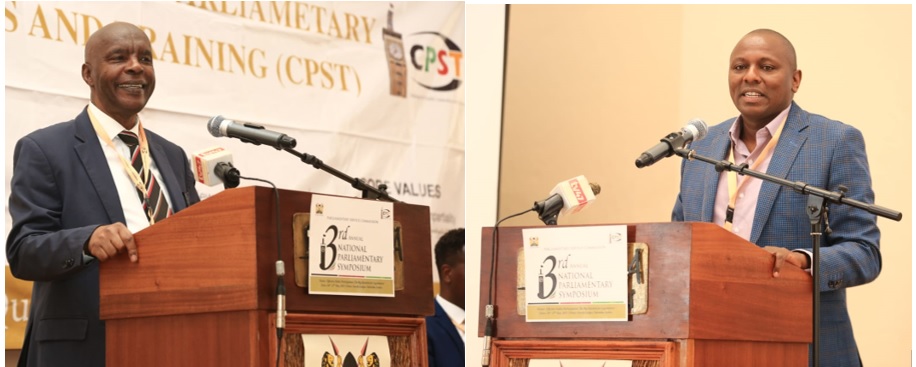FOCUS ON PUBLIC PARTICIPATION PARLIAMENT HOLDS THIRD ANNUAL NATIONAL SYMPOSIUM
Naivasha, Nakuru County
Friday, May 26, 2023
The role of public participation in enhancing democracy has come into sharp focus, at the Parliamentary Service Commission-organized Third Annual Parliamentary Symposium in Nakuru County.
The two-day event themed “Effective Public Participation: The Big Question for Legislatures” is hosted by the Center for Parliamentary Studies and Training. The Symposium was officially opened by the Leader of Majority Partly in the National Assembly Hon. Kimani Ichung’wah on behalf of the Speaker of the National Assembly Hon. (Dr.) Moses Wetang’ula.
Delivering his official opening remarks, Hon. Ichung’wah underscored the place of public participation in the process of legislation, a key requirement in Constitution of Kenya, 2010. He noted that the provision that requires Parliament to conduct public participation during the consideration of every Bill had propelled the country to the peak of countries that have allowed democracy in governance to thrive.
The Leader of the Majority Party added that a lot still needed to be done to improve the process of public participation and to make the process impactful.
“ Our country has emerged a leader in public participation. We however have to ask ourselves, how effective or impactful has it been? Do Kenyans feel their views are taken into account?” he posed.
Hon. Ichung’wah observed that public participation is a fundamental principle of democracy and a requirement of the law. Indeed, it is a requirement of the Constitution of Kenya. “Article 118 of the Constitution requires Parliament to conduct its business openly, and its sittings and those of its committees shall be open to the public. It further requires the facilitation of public participation and involvement in the legislative and other business of Parliament and its committees”, Hon. Ichung’wah held.
While outlining the steps Parliament has taken to implement various mechanisms to facilitate public participation in the legislative process, Hon. Ichung’wah said, “While it is true that more can always be done to enhance public participation, the existing mechanisms, including inviting memoranda, holding public hearings, stakeholder engagement, consultation of experts, and public petitions are steps towards ensuring a more inclusive and participatory democracy”.
Speaking on behalf of the Secretariat of the Parliamentary Service Commission the Secretary to the Commission and Clerk of the Senate, Mr. Jeremiah Nyegenye welcomed participants to the symposium hosted by the Centre for Parliamentary Studies and Training (CPST).
Mr. Nyegenye noted that “the symposium is timely as the recommendations that arise from deliberations and discussions will go a long way in enhancing the way Parliament and indeed legislatures engage with citizens”.
Further, Mr. Nyegenye lauded and commended all the authors at the symposium. “We are indeed honoured to be beneficiaries of your in-depth research on public participation as this will enhance the capacity of Parliament to undertake impactful public participation”, he said.
Mr. Nyegenye emphasized the significance of public participation in shaping legislation and influencing decision-making processes, including the agenda and priorities of legislatures. He added that public participation is a vital catalyst for fostering public trust in institutions including the legislature. The citizenry values inclusion and transparency in the conduct of public affairs.
Making her remarks on behalf of CPST Board, the Board Chairperson Commissioner Hon. Rachel Ameso observed that public participation is important as it helps promote democracy. “Public participation promotes democracy by providing the citizenry with the opportunity to be heard”, she said.
The Keynote Address was delivered by the former Governor Makueni County, Hon. (Prof.) Kivutha Kibwana who also emphasized the importance of public participation in legislation. He took participants through the different mechanisms of achieving public participation ranging from public hearings, memorandum to stakeholder engagements.
The symposium programme is organized to run concurrently in five clusters representing five sub-themes thus; actualization of the constitutional principle of public participation through lawmaking, tools of promoting public participation in legislative oversight, public participation in enhancing the representation role of a legislature, the role of research in propagating effective public participation and capacity building and curriculum development in fostering best practices in public participation.
















